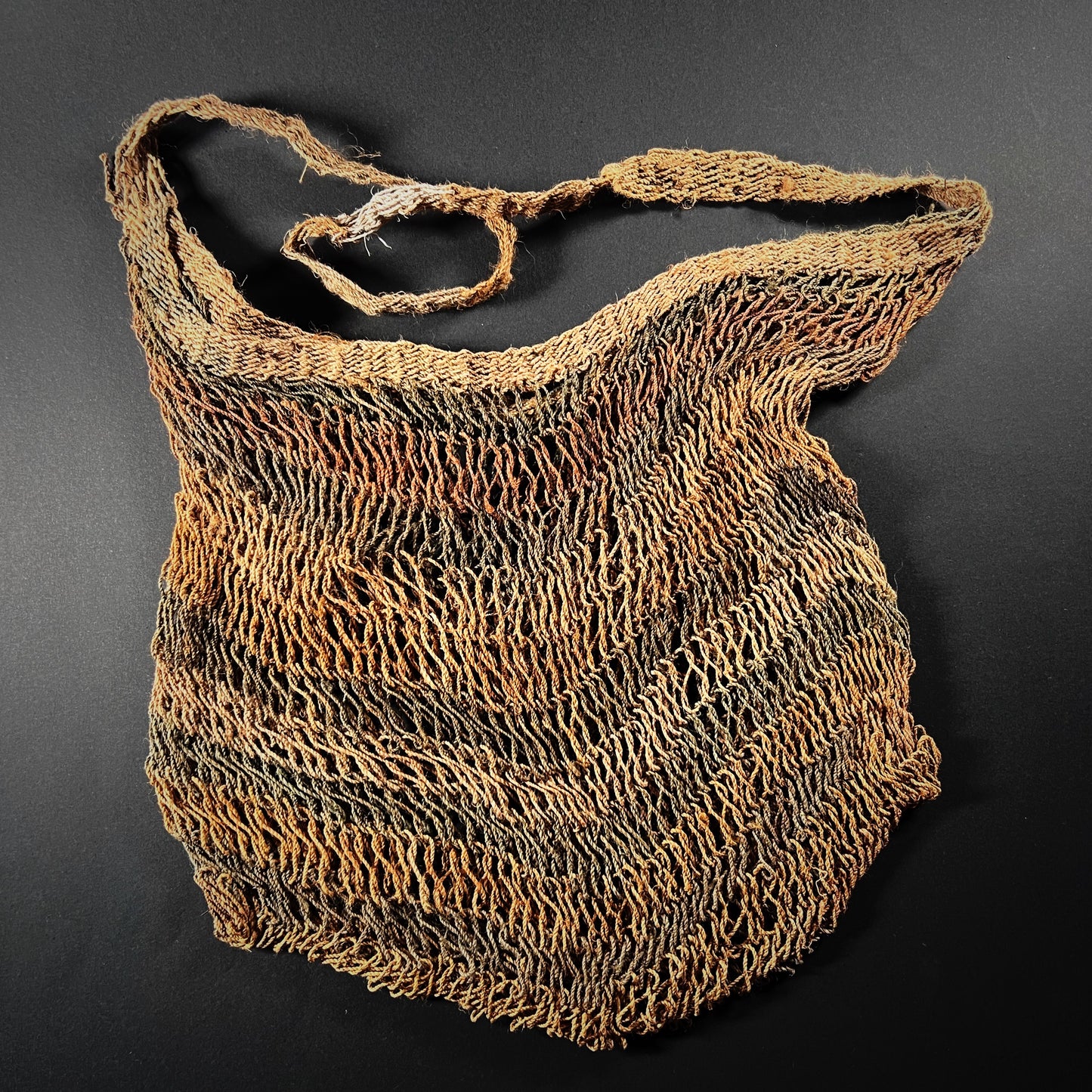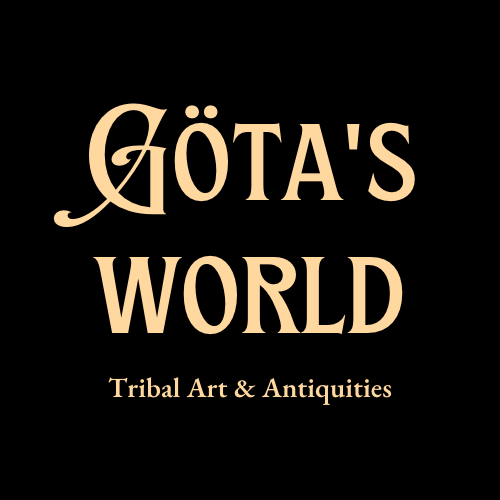Dani Tree-Bark Fibre Net Bag (Noken)
Dani Tree-Bark Fibre Net Bag (Noken)
Couldn't load pickup availability
Dani People, Early–Mid 20th Century, Baliem Valley, Irian Jaya (Papua), Indonesia
A gorgeous and impressively crafted noken (also known as bilum), loosely knitted from hand-processed tree-bark fibre and decorated with horizontal bands in natural colours—likely including yellow orchid fibre. Designed with a long strap for carrying across the forehead, the bag would hang down the user’s back to transport plantation produce, firewood, river catch, or personal belongings. Functional, resilient, and deeply tied to daily life, such fibre bags remain among the most iconic cultural objects of the Dani people.
The Dani inhabit the central highlands of Western New Guinea (the Indonesian province of Papua), particularly the fertile Baliem Valley. One of the largest and most influential highland groups—closely related to the Yali, Moni, and Lani—the Dani were first encountered by Westerners in the late 1930s, with the Dutch establishing their earliest colonial posts in the region in the mid-1950s. Prior to outside contact, the Dani lived as agriculturalists, hunters, and gatherers, maintaining a sophisticated animist belief system centred on land and water spirits, as well as the restless and potentially dangerous ghosts of the newly deceased (mogat). They hold the concept of a soul-substance known as the “seeds of singing” (edai-egen), believed to mature during early childhood and threatened during illness or injury—requiring ritual healing to restore.
Until the introduction of metal tools in the 1960s, Dani material culture relied on stone, bone, pig tusk, bamboo, and wood, with stone axes (kapak) and adzes essential to daily tasks. Pottery was unknown, and gourds served as water containers. Traditional attire remains among the most recognisable in Oceania: men wore the penis sheath (koteka), often accompanied by bird-of-paradise feathers, cowrie shells, pig tusks, or a fibre hairnet, while women wore grass skirts (sili) or, once married, skirts made of fibre coils (yokal) or strings of seeds. Dani craftsmanship is rich and varied, including woven rattan bracelets (sekan), arm and headbands (milak), shell and bone necklaces (mikak), and elaborate head ornaments featuring pig tusks (suale). Among their most valued items were polished stone ye, salt slabs, and the highly practical tree-bark fibre carrier bags—noken or bilum.
The making of noken is a labour-intensive and highly skilled practice. Bark, stems, or branches of select shrubs or trees are cut, heated over fire, soaked, and teased into strong fibres. Once dried and spun into durable string—sometimes coloured with natural dyes—the fibres are hand-knotted into netted bags of varying patterns and sizes. Mastery of the technique takes months of practice, and each finished piece reflects both the maker’s artistry and the deep cultural continuity of the Dani highlands.
Good condition. Surface wear consistent with age and use. Stains. Faded colors. Size approx. Size approx. 21,5cm x 23,5cm x 0,5cm
Provenance: From a Dutch private collection; reportedly originally from the holdings of a now-closed ethnographic museum and foundation in the Netherlands.
For a similar example see:
Carrying Net, Pace, Stichting Papua Erfgoed, Accession Number: EA/59/42 (https://www.papuaerfgoed.org/en/EA/59/42)
References and further reading:
Encyclopedia of World Cultures, Oceania, Karl Heider, edited Terence Hays, G.K.Hall & Company, 1991.
Wealth Items in the Western Highlands of West Papua, Anton Ploeg, Ethnology, Vol.43. No.4 (Autumn 2004), pp. 291-313.
Papua blood: An account of West Papua, Peter Bang, BoD, 16 Apr 2018

-
Shipping
The shipment will be prepared in the course of 3-5 days and dispatched via Posti Group Oyj or purchased item(s) can be picked up from our shop during the store's opening hours (Tarkk’ampujankatu 4, 00140, Helsinki, Finland). Within the Finland, all items are shipped via Posti Group Oyj unless otherwise requested. We pack the items carefully and mainly in recycled materials because we want to save nature. You will receive the tracking number for your items by e-mail.
-
Returns
Returns and exchange will be accepted within fourteen days (14) of receipt at the purchaser’s cost to include freight and packaging. Items must be returned in the same condition as when they were shipped, and will not be accepted if damaged or altered in any way. Please inform us via email (info@gotanmaailma.fi) or by calling +358408408352 before sending. We do not accept returns more than 14 days after delivery.

